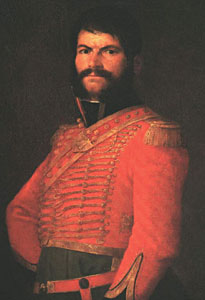
Juan Martín Díaz,
El Empecinado (1775–1825)
The term "guerrilla warfare" is derived from the Spanish guerrilla, which literally means "small-scale war." This term was coined during the Napoleonic intervention in Spain, also known as the Peninsular War. Juan Martín Díaz, nicknamed El Empecinado, was the most famous guerrillero (guerrilla fighter) of the time. Born in the town of Castrillo de Duero, Spain, in 1775, he began his military education at the age of 18. His nickname, common to people from his hometown because of the pecina, or muck, found in the arroyos there, seemed especially appropriate for Díaz because empecinado also translates as stubborn or obstinate. When Napoleon Bonaparte's troops entered Spain in 1808, Díaz refused to idly stand by and let the French become entrenched. He, along with thousands of Spaniards, took up arms in defiance.
Díaz's resistance started small, with only two men under his command, but his leadership and keen eye for strategy quickly earned him a solid reputation, and by 1811 he was leading an army of 3,000 men. His tactics epitomized what we today know as guerrilla warfare: His men staked out the routes between Madrid and Burgos and interfered with enemy communications and supplies. In an attempt to flush out Díaz, French General Joseph Leopold Hugo imprisoned some of Díaz's family members, but the move had disastrous consequences. Díaz retaliated by executing 100 French prisoners of war.
After the French were finally ejected from Spain, Díaz, who was widely celebrated as a patriotic hero, remained true to his ideals and fought to establish a decentralized government rather than adhere to the absolutism of the monarchy. His position rankled King Fernando VII, who eventually imprisoned or exiled the liberals who fought so fervently in the Peninsular War. Díaz was exiled to Portugal in 1823 but later returned to Spain and was arrested. In 1825 he was executed by hanging.
